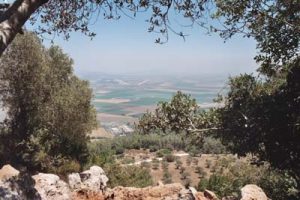by Pastor Ed Visser
For the LORD your God is bringing you into a good land — a land with streams and pools of water, with springs flowing in the valleys and hills; a land with wheat and barley, vines and fig trees, pomegranates, olive oil and honey; a land where bread will not be scarce and you will lack nothing; a land where the rocks are iron and you can dig copper out of the hills. – Deuteronomy 8:7-9
One of the first lectures I heard when I traveled to Israel was entitled, “The Land as the Fifth Gospel.” Since we would be visiting largely New Testament-related sites, it was helpful to see that the land was nearly as illuminating as the four gospels when it came to understanding the life of Jesus.
For the people of Israel, the wilderness had been a testing field, causing their dependence on God. As they came to the promised land, God reminded them of its goodness, but he also issued a warning:
Be careful that you do not forget the LORD your God, failing to observe his commands, his laws and his decrees that I am giving you this day. Otherwise, when you eat and are satisfied, when you build fine houses and settle down, and when your herds and flocks grow large and your silver and gold increase and all you have is multiplied, then your heart will become proud and you will forget the LORD your God, who brought you out of Egypt, out of the land of slavery. – Deuteronomy 8:11-14
Such forgetfulness, which can easily happen when one has all that he/she needs and doesn’t feel the need for God, would bring about dire consequences for Israel. God explains this very pointedly a few chapters later:
Observe therefore all the commands I am giving you today, so that you may have the strength to go in and take over the land that you are crossing the Jordan to possess, and so that you may live long in the land that the LORD swore to your forefathers to give to them and their descendants, a land flowing with milk and honey. The land you are entering to take over is not like the land of Egypt, from which you have come, where you planted your seed and irrigated it by foot as in a vegetable garden. But the land you are crossing the Jordan to take possession of is a land of mountains and valleys that drinks rain from heaven. It is a land the LORD your God cares for;
the eyes of the LORD your God are continually on it from the beginning of the year to its end.So if you faithfully obey the commands I am giving you today — to love the LORD your God and to serve him with all your heart and with all your soul — then I will send rain on your land in its season, both autumn and spring rains, so that you may gather in your grain, new wine and oil. I will provide grass in the fields for your cattle, and you will eat and be satisfied.
Be careful, or you will be enticed to turn away and worship other gods and bow down to them. Then the LORD’s anger will burn against you, and he will shut the heavens so that it will not rain and the ground will yield no produce, and you will soon perish from the good land the LORD is giving you. – Deuteronomy 11:8-17
 God had brought Israel into a very unique land in the Middle East: a land of milk and honey; that is, a land flowing with both shepherds (milk from goats) and farmers (honey from dates) ¬– very unusual in a region that has either one or the other. But a more crucial uniqueness is that the land is utterly dependent on rain — and the God who brings rain. While the Mesopotamian region has the Tigris & Euphrates rivers, and Egypt the Nile, and their fertility comes from flooding and irrigation — Israel is dependent on rain that comes down from the mountain regions to water the land. And it had to come at just the right times: autumn & spring. No rain, no crops = famine!
God had brought Israel into a very unique land in the Middle East: a land of milk and honey; that is, a land flowing with both shepherds (milk from goats) and farmers (honey from dates) ¬– very unusual in a region that has either one or the other. But a more crucial uniqueness is that the land is utterly dependent on rain — and the God who brings rain. While the Mesopotamian region has the Tigris & Euphrates rivers, and Egypt the Nile, and their fertility comes from flooding and irrigation — Israel is dependent on rain that comes down from the mountain regions to water the land. And it had to come at just the right times: autumn & spring. No rain, no crops = famine!
God makes it very clear that the rain is dependent on covenant faithfulness on the part of Israel. Famine would be punishment for their failure; and if they got really bad, God would exile them from the land. We see both types of punishment through the Old Testament, and the Bible and land together help us understand the reasons for it.
While most of us do not live in the land of Israel, and famine is something we’ve never experienced, this connection between God’s blessing of the land and Israel’s obedience to the covenant reminds us that God takes his covenant relationship with us very seriously. Do we?

